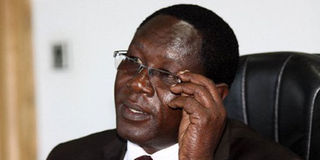CCK postpones digital broadcast migration deadline

Communications Commission of Kenya director general Francis Wangusi. Photo/FILE
What you need to know:
- According to the implementation plan, the government had expected that by July 2012, the DVB T2 digital TV signal would be available in 70 per cent of the country
Kenya will not meet its self-imposed December 2012 national deadline to switch from analogue to digital television broadcasting.
The communications industry regulator on Monday pushed the exercise to after next year's General Election citing prohibitive cost of acquiring set top boxes.
“We are unlikely to meet the December 2012 deadline given that we are moving into an election and the digital set top boxes are still very expensive. We have revised the deadline to after the next General Elections,” Mr Francis Wangusi, the Communications Commission of Kenya (CCK) director general said.
Mr Wangusi was speaking at the side-lines of an international conference on the draft framework agreement on cross border frequency coordination, which will also take stock of the progress on digital migration in Africa.
According to the implementation plan, the government had expected that by July 2012, the DVB T2 digital TV signal would be available in 70 per cent of the country.
This was then expected to allow it start a phased switch-off from December 2012. But according to CCK, the signal coverage is still at 50 per cent.
Currently the digital signal--DVB T2-- is now on air and is available in seven towns including Nairobi, Mombasa, Webuye, Kisumu, Meru, Embu and Eldoret.
The other two phases will involve distributing the signal to other parts of the country before switching off the analogue signal.
The digital migration process recently got a major boost after the government scrapped import duty on the devices that transmit the digital signal to analogue televisions, commonly known as set top boxes.
“Despite the waiver, the set top boxes are still retailing at Sh6,000 and Sh9,000 respectively. This is still unaffordable,” Mr Wangusi said.




